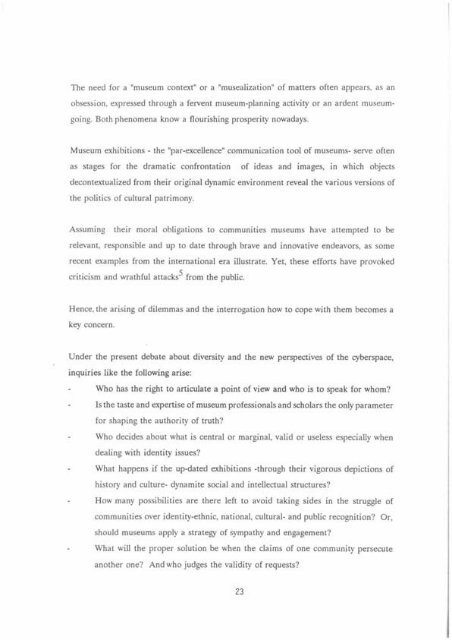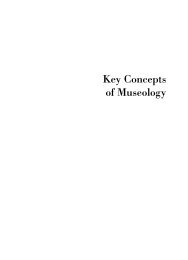ISS 25 (1995).pdf - The International Council of Museums
ISS 25 (1995).pdf - The International Council of Museums
ISS 25 (1995).pdf - The International Council of Museums
You also want an ePaper? Increase the reach of your titles
YUMPU automatically turns print PDFs into web optimized ePapers that Google loves.
<strong>The</strong> need for a "museum context" or a "musealization" <strong>of</strong> matters <strong>of</strong>ten appears, as an<br />
obsession, expressed through a fervent museum-planning activity or an ardent museum<br />
going. Both phenomena know a flourishing prosperity nowadays.<br />
Museum exhibitions - the "par-excellence" communication tool <strong>of</strong> museums- serve <strong>of</strong>ten<br />
as stages for the dramatic confrontation <strong>of</strong> ideas and images, in which objects<br />
decontextualized from their original dynamic environment reveal the various versions <strong>of</strong><br />
the politics <strong>of</strong> cultural patrimony.<br />
Assuming their moral obligations to communities museums have attempted to be<br />
relevant, responsible and up to date through brave and innovative endeavors, as some<br />
recent examples from the international era illustrate. Yet, these efforts have provoked<br />
criticism and wrathful attacks 5 from the pUblic.<br />
Hence, the arising <strong>of</strong> dilemmas and the interrogation how to cope with them becomes a<br />
key concern.<br />
Under the present debate about diversity and the new perspectives <strong>of</strong> the cyberspace,<br />
inquiries like the following arise:<br />
Who has the right to articulate a point <strong>of</strong> view and who is to speak for whom?<br />
Is the taste and expertise <strong>of</strong> museum pr<strong>of</strong>essionals and scholars the only parameter<br />
for shaping the authority <strong>of</strong> truth?<br />
Who decides about what is central or marginal, valid or useless especially when<br />
dealing with identity issues?<br />
What happens if the up-dated exhibitions -through their vigorous depictions <strong>of</strong><br />
history and culture- dynamite social and intellectual structures?<br />
How many possibilities are there left to avoid taking sides in the struggle <strong>of</strong><br />
communities over identity-ethnic, national. cultural- and public recognition? Or.<br />
should museums apply a strategy <strong>of</strong> sympathy and engagement?<br />
What will the proper solution be when the claims <strong>of</strong> one community persecute<br />
another one? And who judges the validity <strong>of</strong> requests?<br />
23
















